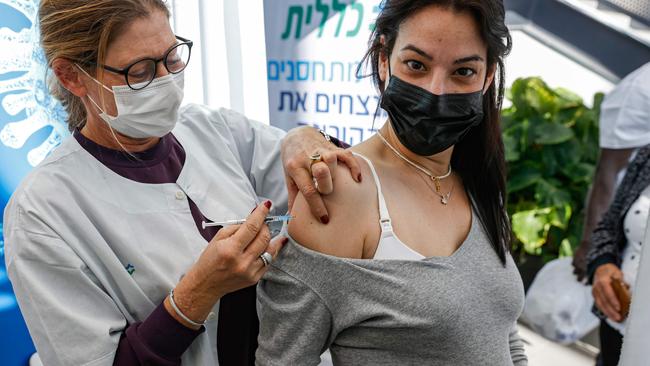War on coronavirus moves to maternity wards
Pregnant women are at higher risk from the British variant of Covid-19, according to Israel’s Health Ministry.

At the Rabin Medical Centre near Tel Aviv, doctors are fighting for the life of a 33-year-old pregnant woman infected with COVID-19. When she was brought in by ambulance last week, they performed an emergency caesarean section, in the hope it would increase her chance of survival by relieving pressure on her lungs.
“We are fighting to keep her alive,” said Ilya Kagan, head of the hospital’s intensive care unit. “We hope that delivering the baby will give both mother and child a better fighting chance.”
In a grim first, 10 pregnant women have been hospitalised across Israel with serious cases of COVID-19. Four were hospitalised in the space of a week, all requiring emergency Caesareans. Two of the women are being treated at the Rabin Medical Centre, where both remain in ICU, on respirators and in induced comas. Their babies are still in incubators, though their situation is stable and improving, with one now breathing by himself. Another baby delivered via emergency caesarean at a different hospital did not survive.
The women who have fallen ill are young and do not suffer from underlying conditions.
Yael Haviv, who heads the ICU at the Sheba Medical Centre and has one of the pregnant women under her care, said the hospital was seeing more young patients in critical condition. “This is no longer an old people’s disease,” said Dr Haviv.
Israel did not see healthy pregnant women fall ill during the first 10 months of the pandemic, leading health officials to re-test and sequence the coronavirus variations afflicting these women.
“Six out of seven tested have the new UK variant,” said Sharon Alroy-Preis, head of Public Health at Israel’s Health Ministry. “There is a certain change in the nature of the pandemic.”
Dr Alroy-Preis confirmed that most of the affected women are from Israel’s ultra-Orthodox Jewish community, which has higher rates of infection than the rest of the population, and where the UK variant was first identified.
Israel’s coronavirus tsar Nachman Ash told ministers last week that the UK variant now accounts for around 30 per cent of infections. He predicted it would become the dominant variant in Israel within weeks.
It was initially reported that the UK variant, B117, was more contagious but not more deadly than the original coronavirus strain, however British Prime Minister Boris Johnson said last Friday that it may be more deadly as well.
Health officials say this may go some way to explaining why the COVID death rate is picking up in Israel. Around a thousand people have died over the past month, a quarter of the total number of lives lost during the pandemic.
As a result, Israel’s Ministry of Health has changed its recommendations and is calling on pregnant women to be vaccinated against COVID-19, even though the vaccine trials did not include pregnant women. “It’s true that since the vaccine was not tested on pregnant women, we don’t have confirmation of its safety,” said Simcha Yagel, head of obstetrics and gynaecology at Jerusalem’s Hadassah hospital.
“But what we do know now, from the other side, is that coronavirus is dangerous, more dangerous than we thought, for pregnant women.
“It’s more dangerous than for other women the same age who are not pregnant. That’s why we are now offering vaccinations to pregnant women. From my reading, the safest time is after the 16th week of pregnancy and that’s what I tell my patients.”
Gili Regev-Yochay, from Israel’s Gertner Epidemiology Institute, says the increased danger of COVID-19 to pregnant women has also been seen in the US, Canada and South Africa.
“It’s about risk management and choosing to be vaccinated against COVID-19 certainly appears to be less dangerous than other vaccinations we routinely give during pregnancy, including shots for flu and whooping cough,” Dr Regev-Yochay said.
“This is a dangerous disease and we’re in a dangerous phase right now, so I say to young women, go get vaccinated.”
Israel has the highest rate of vaccinations in the world. Under its deal with Pfizer, it will act as a pilot program for a rapid vaccine rollout, including providing statistics back to the company. So far, these have shown a higher than expected rate of people contracting COVID-19 after receiving the first dose of the vaccine, in the three-week period before the second dose is due.
Israel has vaccinated more than 2.5 million people — approaching 30 per cent of the population, a figure which includes about 75 per cent of the older population most vulnerable to the virus. But despite this and the imposition of a third nationwide lockdown, infection rates remain high, as the mutating virus races the vaccine.
Fears the vaccine may not be effective against these new variations led cabinet on Sunday to shut down Israel’s airport until the end of the month, citing the Australian model. Opposition politicians have criticised the move, claiming it’s no more than closing the door after the horse has bolted.



To join the conversation, please log in. Don't have an account? Register
Join the conversation, you are commenting as Logout